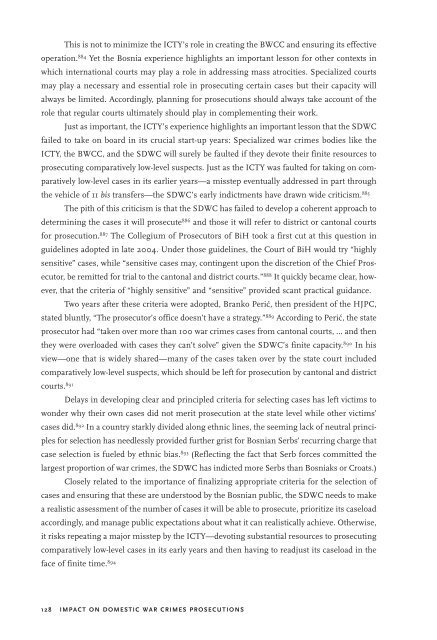That Someone Guilty Be Punished - International Center for ...
That Someone Guilty Be Punished - International Center for ...
That Someone Guilty Be Punished - International Center for ...
You also want an ePaper? Increase the reach of your titles
YUMPU automatically turns print PDFs into web optimized ePapers that Google loves.
This is not to minimize the ICTY’s role in creating the BWCC and ensuring its effective<br />
operation. 884 Yet the Bosnia experience highlights an important lesson <strong>for</strong> other contexts in<br />
which international courts may play a role in addressing mass atrocities. Specialized courts<br />
may play a necessary and essential role in prosecuting certain cases but their capacity will<br />
always be limited. Accordingly, planning <strong>for</strong> prosecutions should always take account of the<br />
role that regular courts ultimately should play in complementing their work.<br />
Just as important, the ICTY’s experience highlights an important lesson that the SDWC<br />
failed to take on board in its crucial start-up years: Specialized war crimes bodies like the<br />
ICTY, the BWCC, and the SDWC will surely be faulted if they devote their finite resources to<br />
prosecuting comparatively low-level suspects. Just as the ICTY was faulted <strong>for</strong> taking on comparatively<br />
low-level cases in its earlier years—a misstep eventually addressed in part through<br />
the vehicle of 11 bis transfers—the SDWC’s early indictments have drawn wide criticism. 885<br />
The pith of this criticism is that the SDWC has failed to develop a coherent approach to<br />
determining the cases it will prosecute886 and those it will refer to district or cantonal courts<br />
<strong>for</strong> prosecution. 887 The Collegium of Prosecutors of BiH took a first cut at this question in<br />
guidelines adopted in late 2004. Under those guidelines, the Court of BiH would try “highly<br />
sensitive” cases, while “sensitive cases may, contingent upon the discretion of the Chief Prosecutor,<br />
be remitted <strong>for</strong> trial to the cantonal and district courts.” 888 It quickly became clear, however,<br />
that the criteria of “highly sensitive” and “sensitive” provided scant practical guidance.<br />
Two years after these criteria were adopted, Branko Perić, then president of the HJPC,<br />
stated bluntly, “The prosecutor’s office doesn’t have a strategy.” 889 According to Perić, the state<br />
prosecutor had “taken over more than 100 war crimes cases from cantonal courts, … and then<br />
they were overloaded with cases they can’t solve” given the SDWC’s finite capacity. 890 In his<br />
view—one that is widely shared—many of the cases taken over by the state court included<br />
comparatively low-level suspects, which should be left <strong>for</strong> prosecution by cantonal and district<br />
courts. 891<br />
Delays in developing clear and principled criteria <strong>for</strong> selecting cases has left victims to<br />
wonder why their own cases did not merit prosecution at the state level while other victims’<br />
cases did. 892 In a country starkly divided along ethnic lines, the seeming lack of neutral principles<br />
<strong>for</strong> selection has needlessly provided further grist <strong>for</strong> Bosnian Serbs’ recurring charge that<br />
case selection is fueled by ethnic bias. 893 (Reflecting the fact that Serb <strong>for</strong>ces committed the<br />
largest proportion of war crimes, the SDWC has indicted more Serbs than Bosniaks or Croats.)<br />
Closely related to the importance of finalizing appropriate criteria <strong>for</strong> the selection of<br />
cases and ensuring that these are understood by the Bosnian public, the SDWC needs to make<br />
a realistic assessment of the number of cases it will be able to prosecute, prioritize its caseload<br />
accordingly, and manage public expectations about what it can realistically achieve. Otherwise,<br />
it risks repeating a major misstep by the ICTY—devoting substantial resources to prosecuting<br />
comparatively low-level cases in its early years and then having to readjust its caseload in the<br />
face of finite time. 894<br />
128 IMPACT ON DOMESTIC WAR CRIMES PROSECUTIONS

















